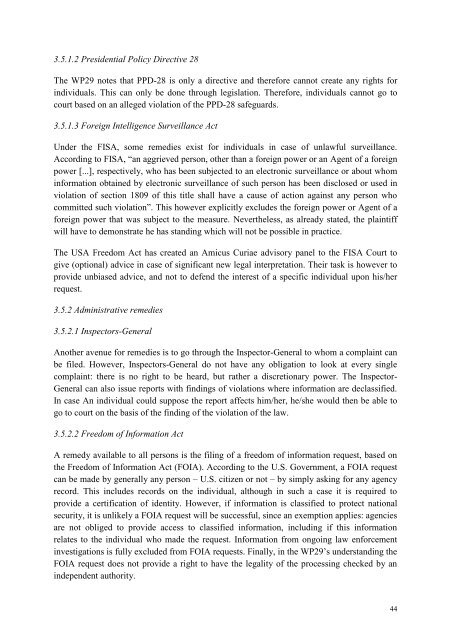ARTICLE 29 DATA PROTECTION WORKING PARTY
1SANK0H
1SANK0H
You also want an ePaper? Increase the reach of your titles
YUMPU automatically turns print PDFs into web optimized ePapers that Google loves.
3.5.1.2 Presidential Policy Directive 28<br />
The WP<strong>29</strong> notes that PPD-28 is only a directive and therefore cannot create any rights for<br />
individuals. This can only be done through legislation. Therefore, individuals cannot go to<br />
court based on an alleged violation of the PPD-28 safeguards.<br />
3.5.1.3 Foreign Intelligence Surveillance Act<br />
Under the FISA, some remedies exist for individuals in case of unlawful surveillance.<br />
According to FISA, “an aggrieved person, other than a foreign power or an Agent of a foreign<br />
power [...], respectively, who has been subjected to an electronic surveillance or about whom<br />
information obtained by electronic surveillance of such person has been disclosed or used in<br />
violation of section 1809 of this title shall have a cause of action against any person who<br />
committed such violation”. This however explicitly excludes the foreign power or Agent of a<br />
foreign power that was subject to the measure. Nevertheless, as already stated, the plaintiff<br />
will have to demonstrate he has standing which will not be possible in practice.<br />
The USA Freedom Act has created an Amicus Curiae advisory panel to the FISA Court to<br />
give (optional) advice in case of significant new legal interpretation. Their task is however to<br />
provide unbiased advice, and not to defend the interest of a specific individual upon his/her<br />
request.<br />
3.5.2 Administrative remedies<br />
3.5.2.1 Inspectors-General<br />
Another avenue for remedies is to go through the Inspector-General to whom a complaint can<br />
be filed. However, Inspectors-General do not have any obligation to look at every single<br />
complaint: there is no right to be heard, but rather a discretionary power. The Inspector-<br />
General can also issue reports with findings of violations where information are declassified.<br />
In case An individual could suppose the report affects him/her, he/she would then be able to<br />
go to court on the basis of the finding of the violation of the law.<br />
3.5.2.2 Freedom of Information Act<br />
A remedy available to all persons is the filing of a freedom of information request, based on<br />
the Freedom of Information Act (FOIA). According to the U.S. Government, a FOIA request<br />
can be made by generally any person – U.S. citizen or not – by simply asking for any agency<br />
record. This includes records on the individual, although in such a case it is required to<br />
provide a certification of identity. However, if information is classified to protect national<br />
security, it is unlikely a FOIA request will be successful, since an exemption applies: agencies<br />
are not obliged to provide access to classified information, including if this information<br />
relates to the individual who made the request. Information from ongoing law enforcement<br />
investigations is fully excluded from FOIA requests. Finally, in the WP<strong>29</strong>’s understanding the<br />
FOIA request does not provide a right to have the legality of the processing checked by an<br />
independent authority.<br />
44


